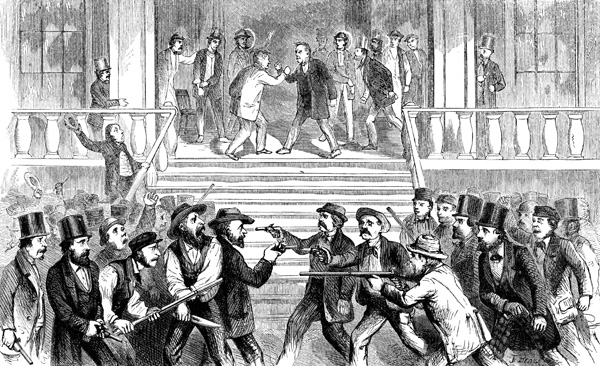In 1854, Douglas compiled a bill that would set up a government in the Nebraska Territory. The region would be organized according to the idea of popular sovereignty. The people of the territory themselves would democratically choose whether to allow slavery or abolish it when they applied for statehood. In theory this would have been an excellent idea, however, Douglas did not factor in the mentally of some settlers. Kansas attracted settlers from the north and south, both with their own political motives at heart. The apposing groups wanted to outnumber the other, so that when it came time to vote, the bigger group could control the government. In no time at all, a proslavery town and an antislavery town were established. Both towns competed to petition for statehood and submitted their own constitutions. With both towns trying to claim their statehood, following the principle of popular sovereignty, tensions rose. This battle for control lead to devastating violence in the Kansas territory.
With both groups at each others necks, it's no surprise that a wave of violence occurred. A group of Border Ruffians, proslavery supporters, decided to raid the antislavery town of Lawrence. They broke into houses, burned down buildings, and most importantly destroyed the presses of The Kansas Free State newspaper. An Immediate counter attack came from John Brown, an abolitionist who found
comfort in fighting slavery head on. He gathered his sons and a few friends to carry out a midnight execution of five proslavery settlers near Pottawatomie Creek. An exchange of violence continued to occur for several years. This conflict adopted the name Bleeding Kansas. Bleeding Kansas was only a short term effect of the institution of popular sovereignty, the long term effect was the Civil War.
Slavery not only lingered in the minds of normal American citizens, it also lingered in the conversations and arguments inside of Congress. The topic of slavery inside of Congress created a lot of unneeded tension between the Northern and Southern politicians. Their was such passion in each sides debates over the topic that some times the disagreements turned into verbal and in one instance physical violence. Members of Congress started to come to work with pistols, canes and swords. The very people we put in charge to create a peaceful and protected union could not even work together.
The worst case of violence in congress was between Charles Sumner and Preston Brooks. Senator Sumner was giving a speech about the atrocities occurring in the crisis of Bleeding Kansas. As a northerner himself, he could not help but call out slavery as evil and specifically target on man, Senator Andrew Butler. Senator Butler was a southerner and was not present the day of Sumner's speech. However, Senator Preston Brooks, Butlers nephew, heard about the speech a few days later. In rage over the insults, he beat Senator Sumner unconscious with a cane while Congress was in
session. This only further shows how Bleeding Kansas and slavery truly did separate the citizens and the politicians at the time.
It didn't take people too long to figure out that the unfortunate killing and violence was a result of instituting the principle of popular sovereignty.
Fore more insight on this period of history, check out this amazing Video and this website History Channel!


